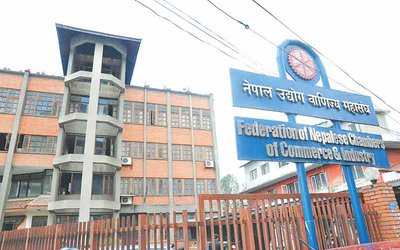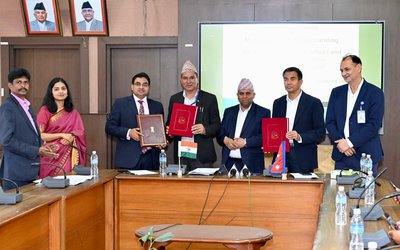
With a small staff and high output, small lending and high returned, strong motivation and great outreach, Sana Kisan Bikas Bank has transformed the livelihood of over a million cash-starved small farmers by providing the much needed loan for them.
Under the leadership of Chief Executive Officer Jalan Kumar Sharma and backing of chairman of the Bank, Sanakisan Bank has stood as a lifeline for the overall development of small and marginalized farmers.
With almost 99 percent loan recovery, the bank has also shown that investing in small and marginalized farmers is more worthy and less risky than investing in big industries.
As it celebrated its fifteenth anniversary, Sana Kisan Bank proved itself as an organization dedicated to uplift the livelihood of small farmers enabling them to increase the productivity.
The 15 years of journey of the bank is steady but the progress of last six years is more praiseworthy in terms of progress of the bank. From the observation of former governor of Nepal Rastra Bank and vice chairman of National Planning Commission Dr. Yubaraj Khatiwada, last five years of journey of the bank is noticeable.
“If I ask a question to Bank’s management, what have you done in the last five years?” I myself find the answer as the bank has enhanced the capacity of the institution doubling the number of member institutions. Similarly, the bank has increased transaction seven times, five times in profit but the staff has just doubled during the last five years. Recovering ninety-five percent of loan in the schedule, the Sana Kisan Bikas Bank Ltd, a D category Development Bank, has shown a successful model to even big banks,” said chief guest and vice chairman of National Planning Commission Dr. Khatiwada. “The bank has also set an example that the investment made in rural areas and in agriculture sector has returned as bank has secured 99 percent returns. This is a good reply to those who plead that investment in agriculture sector is risky. I would like to thank the bank’s management for giving reply to those who express reluctance in making investment in rural agriculture sector.”
Given the capable and strong management team, the institution like Sana Kisan Bank can make transformation in rural livelihood. “After looking at the success of Sana Kisan Bank, I am convinced now that there is need of separate regulations to govern specialized financial institutions,” said Dr. Khatiwada.
“There is the need to replicate the work done by Sana Kisan Bikas Bank Ltd (SKBBL). But specialized financial institutions like agriculture, industrial, clean energy, among others, would be able to focus on their special motives if regulatory frameworks are designed accordingly,” said Dr. Khatiwada.
SKBBL is a microfinance focused on livelihood improvement of smallholder farmers. “SKBBL, currently working in 57 districts through 525 cooperatives, has been extending access to finance with 364,000 female and 128 male totaling 492,000 families with 2.5 million populations. Moreover, 204 new cooperatives are in the stage of formation. If we include all, the bank served more than 550,000 families,” said CEO Jalan Kumar Sharma. “With a total 74 percent women's participation, I am proud to say that more than half of cooperatives are run by women.”
Till the first half of this fiscal, the financial institution had issued credit worth Rs 30.71 billion and recovered Rs 22.12 billion. SKBBL has also received Rs five billion from the Nepal government at one per cent interest to provide credit for livestock and meat production activities and the loan was issued to 60,000 rural families, according to Jalan Kumar Sharma, CEO of SKBBL.
With the paid-up capital of Rs 402.45 million, cooperatives have 39 percent shares followed by 30 common people, 22 percent by Agricultural Development Bank, 6 percent Nepal Bank and 3 percent NABIL Bank.
Small Farmers in Israel
SKBBL has also been authorized to select agriculture students to take part in Israeli government’s ‘learn and earn’ program. Altogether, 1,150 students have been sent to Israel to study agriculture in reputed institutions of Israel. Among them, 600 have returned after completing their 10-month long course and embraced entrepreneurship in agriculture and agro processing, informed Sharma.
In the program, SKBBL felicitated former ambassador of Israel to Nepal Hanan Goder for his initiative to collaborate with SKBBL to send Nepali students in Israel to learn about agriculture practices there.
Established in July 2001, Small Farmers Development Bank (Sana Kisan Bikas bank); as an apex microfinance bank emerged to provide wholesale credit along with the technical support services mainly to the Small Farmers Agriculture Cooperatives Ltd. (SFACLs) and similar types.
The bank is incorporated under the Company Act and licensed under the Bank and Financial Institutions Act (BAFIA) 2006 as a “D” class bank.
“There is the need to professionalize agriculture to increase the production and productivity. Small farmers play a pioneering role in agriculture production. Just fulfilling the capital needs of farmers, it can enhance productivity of small farmers benefiting the country as a whole,” said Sharma.
- IME GROUP: Expands Into Paper Industry
- Mar 24, 2025
- CPN UML: Instigated By India
- Mar 23, 2025
- ADB’S CHIEF ECONOMIST: Nepal Reduces Poverty
- Mar 11, 2025
- FM DR. DEUBA: A Successful Visit
- Mar 11, 2025
- MD GHISING: Target Of Personal Grudge
- Mar 09, 2025















